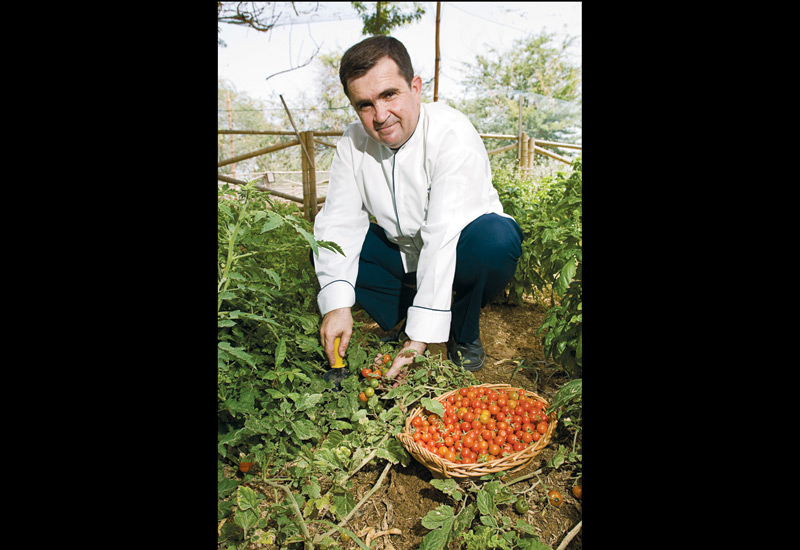Advocates of the kitchen garden laud this environmentally-friendly method of getting organic produce into the kitchen — but will the trend take off in import-reliant Middle East outlets?
Fresh produce is a must for any kitchen worth its salt — and in the Middle East, where so few items are grown locally, outlets have traditionally relied on imported products.
But a brave new set of restaurants are changing the established order by venturing into the world of kitchen gardens.
Jebel Ali Golf Resort and Spa is famed for its garden, which provides cherry tomatoes, cauliflowers, pomegranates, lemons, limes and guava for its outlets.
“We originally started growing things ourselves because we always had issues finding good quality herbs,” explained Signatures restaurant executive chef Didier Gusching.
“It’s also a step towards making the resort more environment friendly.”

| Advertisement |
Six Senses Hideaway Zighy Bay started its own organic garden nine months ago.
Resident manager Ashish Modak commented: “We have been able to grow all the salad greens on our menus in our own garden, plus some tomatoes, aubergines and chillies.
“In the coming months, the organic garden is due for further expansion and by winter, we want to rely solely on our own garden for all our requirements. This would mean we are not only able to offer absolutely fresh produce but we will also save on the wasted carbon miles.”
Wael Ahmed Farouk, director of engineering for Courtyard by Marriott and Marriott Executive Apartments, Green Community, Dubai Investment Park, started an organic garden as part of the property’s eco-programme in 2007.
“We’ve produced a lot of tomatoes, cabbages, basil, carrots, beetroot, snowpeas and corn. We don’t serve it in our restaurants but we do use it in our staff cafeteria, and it’s very good,” Farouk said.
The property’s executive chef Christian Biesbrouk added: “The quantity that comes from the garden is small, but it’s all organic and very flavoursome. Now we have seen what works well, we will certainly aim to grow for our outlets in future.”
Farouk added: “It’s a concept we originally developed to be environmentally friendly — it was mainly about raising awareness among our staff.”
The ‘green’ angle is considered a key benefit of such gardens, said Jebel Ali Golf Resort and Spa’s Gusching.
“People today are more environmentally aware — it’s worked well for us because they like having the option of an eco-conscious restaurant in Dubai,” he explained.
Six Senses’ Modak added: “All the Six Senses resorts are remotely located and importing food means causing more burden on environment, which growing our own greens completely brings down. Many of our guests are aware of these facts and hence very appreciative of this.”
[[PAGE-BREAK]]
But in reality, how significant is the environmental impact of such gardens?
Fresh UAE, a recently-launched subsidiary of UAE-based seafood supplier Wet Fish, is just one of the suppliers importing fresh produce into the region. The company’s produce import manager Kevin Southgate agreed that in principle anything benefitting the environment was worthy of merit, but said it was in fact doubtful whether kitchen gardens had any significant impact.
“In order to have any hope of a positive green effect, you would have to persuade every F&B outlet in the Emirates to follow suit,” he said.
Even the savings on greenhouse gas emissions from importing less were negligible, continued Southgate. “At present, quality produce from Europe and elsewhere arrives two or three tonnes at a time on wide-bodied jets. So what would happen to air transport if this freight demand were to disappear? Nothing. The primary cargo is humans, not vegetables, and Dubai wants to attract more humans, so there will be more planes, not fewer,” he asserted.
“Not one single flight will ever be cancelled because there are no vegetables aboard.”
But even if the green impact is minimal, home-grown produce does still have some appeal.
As Mövenpick Hotel Kuwait communication coordinator Dina Ghazali pointed out, “there can be nothing fresher than something that comes out of your own garden”.
However Ghazali said the Kuwait property had not implemented its own garden just yet.

| Advertisement |
“There are challenges — the space that we’d need to dedicate for the garden, finding an area with good drainage, protecting the plants from pests and adverse weather conditions and having sufficient access to water for irrigation,” she listed.
The regional climate also presented a problem, admitted Jebel Ali Golf Resort and Spa’s Gusching, while Marriott’s Farouk pointed out that there were regulations regarding serving home-grown food. “To serve such produce to guests, we do have to coordinate with the municipality health department,” he explained.
Outlets that have established a working kitchen garden seem delighted with the results — but will the trend take off?
Fresh’s Southgate remained doubtful. “When people do their sums they will realise that growing a kilo of fresh produce will cost more than buying a kilo from an importer,” he said.
“It seems probable that, in the short term, there will be increased local growing of products which are endemic to the hotter regions of the world, such as mangos, dates and pineapples, as well as specialised produce which is inherently expensive, such as micro salad leaves and baby vegetables. “However, for those who appreciate world-class quality, all the ingenuity of man will be unlikely to reproduce slow-ripening Scottish raspberries, or slow-maturing English asparagus,” he pointed out.
But Six Senses’ Modak insisted the trend would “catch up”.
“I believe that in the next few years, kitchen gardens and fresh produce on menus will be a hit across the region,” he said.









 Search our database of more than 2,700 industry companies
Search our database of more than 2,700 industry companies









